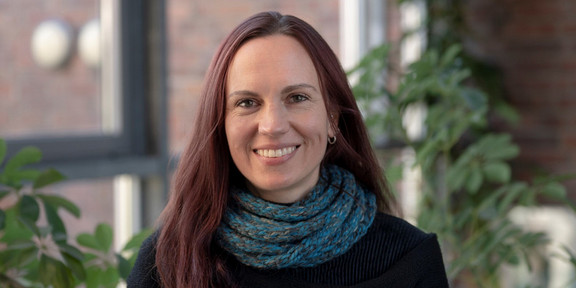"A good idea alone does not make a good proposal"

At the Social Research Center Dortmund, Kerstin Guhlemann investigates issues related to labor policy and health. Among the five externally funded projects she supervises in parallel are Strategic Partnerships in the Erasmus+ program, which are defined through international educational collaborations with close links to the participants. In this interview, Kerstin Guhlemann talks about her experiences with the program and possible hurdles on the way to a successful application.
Ms. Guhlemann, what are you currently researching?
Within my research area of "labor policy and health," the topics are almost always shaped by current events, e.g., occupational health and safety in times of the Pandemic, concepts of labor market integration, or digitization in the skilled trades. At the moment, I find the empowering effect of Social Art methods in the fields of health and integration particularly interesting. For example, this involves using theater training to promote key competencies such as communication and expressiveness, which facilitate the labor market integration of young people. This practice-oriented work is enriching for all participants and gives us important impulses for our research, for example in the expansion of our own methods. Of course, close cooperation with practitioners is also important for us in general: Without accompanying a craftsman in his everyday life for a day, for example, I can't really understand his work situation. And if I can't do that, I can't make any recommendations for how to organize his work that aren't completely out of touch with his everyday work life.
How do you actually find suitable partners for an international consortium like this?
The process is very different. For international projects like Erasmus+, there are websites that help you find partners, for example Epale or networks like Ashoka. Of course, there's no guarantee that you'll always be a good strategic match. In any case, it is helpful to exchange ideas with colleagues, which is how I was able to find a few suitable contacts. As a rule, consortia work best when many of the participants already know each other. Once you have successfully carried out a project together, the follow-up applications can become more easy, because then new partnerships and suitable constellations form almost by themselves. But one thing is very important: To allocate sufficient time! Even if everyone is motivated and wants to work together, early coordination is needed. That starts, but does not end with the administrative processes. Who has to provide which information and where? Who needs which signature from whom? The sooner you take care of these issues, the better.
You have submitted several successful Erasmus+ applications - do you have any tips for the application process?
Erasmus+ applications are really diligence work, the documents are extensive and the required information quite detailed. In addition, financial contributions are required even for funded projects. Therefore, the format only fits if you want to build European collaborations and have long-term strategic goals. Fortunately, I had successful applications from colleagues to guide me, but I still had to sacrifice a lot of free time - and when the first rejection came, I was naturally disappointed. But you can't expect the first application to work. The positive thing about Erasmus+ is that you get detailed feedback from the reviewers so that you can revise your application, which is incredibly valuable! A good idea alone does not make a good application, and the requirements differ greatly depending on the funding body. For example, I revised and resubmitted my first EU application four times in twelve months until it was accepted. But when I finally succeeded, my two subsequent applications were also funded. So I do believe that you can learn how to write applications through experience and feedback on the reviews.
Personal details:
- since 2019: coordination of the research area "Labor Policy and Health" at the Social Research Center Dortmund
- since 2011: research associate in the research area "Labor Policy and Health" at the Social Research Center Dortmund (Germany)
- 2011 - 2015: research assistant at the Institute for Work Science at the RUB
- 2004 - 2010: studies of sociology and media sciences at the Ruhr-University Bochum (RUB)
Further information:




![[Translate to English:] [Translate to English:]](/storages/zentraler_bilderpool/_processed_/a/f/csm_Kontakt_b86e8d8ecc.png)
![[Translate to English:] [Translate to English:]](/storages/sfs-sowi/_processed_/7/e/csm_header_collage_sfs_eving_sozialforschungsstelle_dortmund_31bd3c09fb.jpg)